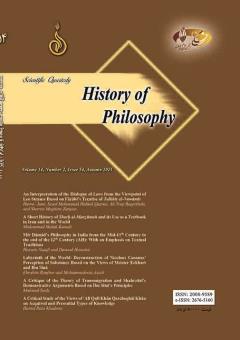An Interpretation of the Dialogue of Laws from the Viewpoint of Leo Strauss Based on Fārābī’s Treatise of Talkhīṣ al-Nawāmīs
Subject Areas : New findings regarding the development of ancient western philosophy (Greek and Hellenistic Philosophies)Havva Jami 1 * , Seyed Mohammad Hakkak Qazvini 2 , Ali Naghi Baghershahi 3 , Shervin Moghimi Zanjani 4
1 - PhD candidate of Philosophy, Imam Khomeini International University, Qazvin, Iran
2 - Professor at the Philosophy Department of Imam Khomeini International University, Qazvin, Iran
3 - Associate Professor, Philosophy Department, Imam Khomeini International University, Qazvin, Iran
4 - Assistant Professor, Research Group of Applied Studies on Politics, Institute for Humanities and Cultural Studies, Tehran, Iran
Keywords: Laws, Fārābī, Talkhīṣ al-Nawāmīs, Strauss, Historicism, theology, Plato,
Abstract :
Presently, historicism is the dominant approach in interpreting philosophical traditions. This approach considers each science, particularly philosophy, to be in some way related to the specific lifetime of thinkers. Within this framework, historicist interpreters examine Plato’s works in relation to four different periods, with the dialogue of Laws belonging to the latest period of his life, indicating a change in his approach. However, in opposition to any kind of historicist view, Leo Strauss disagrees with this division and believes that there is no change of direction in Plato’s overall philosophy – from the first to the last dialogue – and all of them address philosophical problems from a specific standpoint. We encounter this comprehensive approach also in Strauss’ reading of the dialogue of Laws. In fact, Strauss believes that, in order to grasp a real understanding of the dialogue of Laws, one must follow his method and consider Fārābī’s interpretation of this work in Talkhīṣ al-nawāmīs as a basis. Strauss also maintains that it is the only way through which one can go beyond the limits of historical interpretation. While providing a brief discussion of the historical interpretation of the Laws, the purpose of the present study is to examine Fārābī’s interpretation of the dialogue of Laws, Strauss’ critique and view of this interpretation, and the most distinctive features of Strauss’ innovative interpretation of this dialogue.
ارسطو (1358) سیاست، ترجمۀ حمید عنایت، تهران: امیرکبیر.
اشتراوس لئم؛ کراپسی، جوزف (1398) تاریخ فلسفۀ سیاسی، ترجمۀ یاشار جیرانی و شروین مقیمی، ج1، تهران: پگاه روزگار نو.
اشتراوس، لئو (1387) فلسفۀ سیاسی چیست؟، ترجمۀ فرهنگ رجایی، تهران: علمی و فرهنگی.
اشتراوس، لئو (1392) شهر و انسان، ترجمۀ رسول نمازی، تهران: آگه.
اشتراوس، لئو (1397) حق طبیعی و تاریخ، ترجمۀ باقر پرهام، تهران: نشر آگاه.
افلاطون (1380) دورۀ آثار افلاطون، ترجمۀ محمد¬ حسن لطفی، تهران: خوارزمی.
بورمان، کارل (1387) افلاطون، ترجمۀ محمدحسن لطفی، تهران: طرح نو.
رضوانی، محسن (1383) «اشتراوس و روش¬شناسی فهم فلسفۀ سیاسی اسلامی»، فصلنامۀ علوم سیاسی، شمارۀ 28، ص15ـ30.
فارابی، ابونصر محمد (1395) تلخیص نوامیس افلاطون، ترجمۀ احمد فرادی اهوازی، تهران: نگاه معاصر.
گاتری، ویلیامکیتچمبرز (1377) تاریخ فلسفۀ یونان، ج18، افلاطون (6)، ترجمۀ حسن فتحی، تهران: فکر روز.
گراهام، دانیل (1400) پاره¬نوشته¬های پیشاسقراطی، ترجمۀ بهناز دهکردی، تهران: امیرکبیر.
گمپرتس، تئودور (1376) متفکران یونانی، ترجمۀ محمدحسن لطفی، تهران: خوارزمی.
مینایی، فاطمه (1384) «قرائت لئو اشتراوس از تلخیص¬النوامیس فارابی»، نشریۀ اشراق، شمارۀ 2 و3، ص304ـ277.
Basili, C. (2016). The cave of modernity. Madrid University Press.
Basili, C. (2020). The limits of the City; Leo Strauss’s Hermeneutics and Plato’s Republic. Comparative and Continental Philosophy. vol. 12, no. 3, pp. 197-210.
Heidegger, M. (2007). The Essence of Truth; On Plato's Cave Allegory and Theaetetus. translated by T. Sadler. London: Continuum.
Mahdi, M. (1962). AL Farabi, Philosophy Of Plato and Aristotle. the Free Press of Glencoe.
Strauss, L. (1988b). How Farabi read Plato’s Law. in What is Political Philosophy. Chicago: University of Chicago Press.
Strauss, L. (1945). Farabi’s Plato. in L. Ginzberg: Jubilee volume on the occasion of his seventieth birthday. New York: American Academy for Jewish Research. pp. 357-393.
Strauss, L. (1963). Plato. in L. Strauss & J. Cropsey (eds.). History of Political Philosophy. Chicago, IL: University of Chicago Press. pp. 7-63.
Strauss, L. (1964). The Crisis of our Time. in H. J. Spaeth (ed.). The predicament of Modern Politics. Detroit: The University of Detroit Press. pp. 41-54.
Strauss, L. (1970). Seminar on Plato’s Laws. St. John’s College, Annapolis. https://leostrausscenter.uchicago.edu/plato-laws-st-johns-college-1970-71.
Strauss, L. (1975). Some remarks on political science of Maimonides and Farabi. trans. By Robert Bartlett. Interpretation, vol. 18, no. 1, pp. 3-30 (1990)
Strauss, L. (1977). The argument and the action of Plato’s Laws. University of Chicago Press.
Strauss, L. (1978). The City and Man. USA: The University of Virginia Press.
Strauss, L. (1988a). Persecution and the Art of Writing. USA: University of Chicago Press.
Strauss, L. (1989). How to begin to study Medieval Philosophy. Chicago: University of Chicago Press.
Strauss, L. (1995). On the Minos. in Liberalism Ancient and Modern. Chicago & London: University of Chicago Press, pp. 65-75.
Zuckert, C. H. (1996). Postmodern Platos: Nietzsche, Heidegger, Gadamer, Strauss, Derrida. USA: The University of Chicago Press.
Zuckert, C. H. (2011). Strauss’s New Reading of Plato. in J. G. York & M. A. Peters (eds.). Leo Strauss, Education, and Political Thought. Vancouver, Canada: Fairleigh Dickinson University Press. pp. 52-75.

